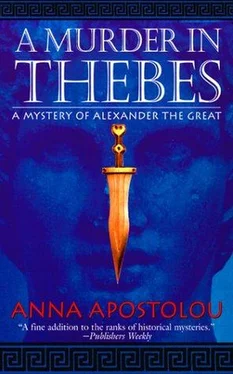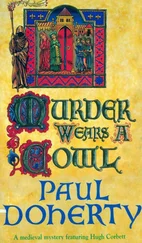Paul Doherty - A Murder in Thebes
Здесь есть возможность читать онлайн «Paul Doherty - A Murder in Thebes» весь текст электронной книги совершенно бесплатно (целиком полную версию без сокращений). В некоторых случаях можно слушать аудио, скачать через торрент в формате fb2 и присутствует краткое содержание. Год выпуска: 2013, ISBN: 2013, Издательство: Headline, Жанр: Исторический детектив, на английском языке. Описание произведения, (предисловие) а так же отзывы посетителей доступны на портале библиотеки ЛибКат.
- Название:A Murder in Thebes
- Автор:
- Издательство:Headline
- Жанр:
- Год:2013
- ISBN:9780755395736
- Рейтинг книги:4 / 5. Голосов: 1
-
Избранное:Добавить в избранное
- Отзывы:
-
Ваша оценка:
- 80
- 1
- 2
- 3
- 4
- 5
A Murder in Thebes: краткое содержание, описание и аннотация
Предлагаем к чтению аннотацию, описание, краткое содержание или предисловие (зависит от того, что написал сам автор книги «A Murder in Thebes»). Если вы не нашли необходимую информацию о книге — напишите в комментариях, мы постараемся отыскать её.
A Murder in Thebes — читать онлайн бесплатно полную книгу (весь текст) целиком
Ниже представлен текст книги, разбитый по страницам. Система сохранения места последней прочитанной страницы, позволяет с удобством читать онлайн бесплатно книгу «A Murder in Thebes», без необходимости каждый раз заново искать на чём Вы остановились. Поставьте закладку, и сможете в любой момент перейти на страницу, на которой закончили чтение.
Интервал:
Закладка:
A squadron from the cavalry was sent out-the best horsemen in the army-along with musicians and standard bearers, to greet the queen. At last she entered the camp in a blare of trumpets and with men flanking her chariot on either side.
“Just look at her!” Alexander whispered. “By all that’s holy! Just look at her! For Olympias, everything has to be dramatic; Mother never changes.”
Miriam stared down at the lustrous chariot pulled by two white horses, their harness and strapping of burnished gold. The chariot itself was ceremonial-plated with silver, a gold rail along its high top. Olympias now clutched this with one hand, the other raised in salute. As she passed, the guardsmen clashed their spears against their shields and sang a poem of praise. Olympias was dressed in purple-and-gold robes over a snow-white tunic. Her reddish hair shiny, thick; the silver crown on her forehead was gold, encrusted with the most precious jewels: her beautiful, imperious face was hidden behind a silver mask that covered all but her eyes and mouth.
“Oh no,” Alexander groaned, “she’s in one of her Medea moods. The ‘tragic queen’ returns to Thebes.” He pushed back his own cloak, stepped off the dais, and helped his mother out of her chariot. She bowed, almost a nod, and then let her son escort her onto the dais to receive the acclamation of the army. She did this, smiling, one hand raised, and all the time talking quickly to Alexander.
“That chariot’s bloody uncomfortable!” she hissed. “I nearly fell off the damn thing! I want it mended!”
“There’s nothing wrong with the chariot Mother!” Alexander snapped. “It’s built to go along smooth paths, not rocky ground!”
“Don’t contradict me,” Olympias retorted. “And don’t scowl, Alexander; I’ve told you before, it reminds me of Philip.”
Alexander forced a smile. Once the acclamation was over Olympias was led off the dais and into the pavilion. Simeon, Miriam, and the other companions followed. Olympias was given a seat of honor. Alexander on her right, Hephaestion on her left. Olympias now removed her silver mask and looked daggers at her son, her sea-gray eyes blazing with fury, her beautiful smooth face twitching in annoyance.
“She hates Hephaestion,” Miriam whispered to Simeon, “and Alexander knows that.”
The servants brought in wine bowls and water jugs. The cooks had surpassed themselves; animals had been hunted and killed and the fresh meat dressed in sauces. Each dish was presented first to Olympias but she was more interested in the silver-and-gold plate and cups looted from Theban treasuries.
“Don’t worry Mother,” Alexander rubbed his hands and stared round the tent, “I’ve put your portion aside to take back to Pella. When are you going?”
“I’ve just arrived,” Olympias hissed. She picked up a cup and admired the pattern around the rim. “Don’t be insolent, Alexander. I came to see Thebes but you’ve burned it. I also brought my troupe of actors.”
The grin faded from Alexander’s face. Olympias rolled back the sleeve of her gown.
“I have decided,” she declared for all the tent to hear, “to stage the great trilogy of Sophocles- Oedipus the King, Oedipus at Colonus , and Antigone . In the first two I will play Jocasta, in the third Antigone. Ah, Miriam.” She smiled dazzlingly down as the Israelite desperately tried to hide behind her brother. “You are an actress. You and your brother. You are both to join. I’ve heard about the play you put on, about the stories and traditions of your people. Niarchos, stop smirking; you can be Cleon. Perdiccas you can be Haemon. And of course,” she glanced over her shoulder at Aristander, her old necromancer, “you can be Teiresias, the soothsayer.”
“But he was blind!” Aristander moaned.
“If you don’t play your part well, I will personally arrange that!” Olympias rapped. “Now, son, let us eat, and tell me all that has happened to you.”
The evening remained tense. Alexander’s companions always felt wary when Olympias was near. Sharp of eye, tart of tongue, and quick of wit, Olympias could be as vicious as one of her vipers. As the feast went on, she shifted from one mood to another. Miriam quietly confessed to Simeon that she could sit and watch Olympias all evening, provided she didn’t have to sit too close. Sometimes Olympias was a tearful mother complaining about Alexander’s officers back in Pella. Other times she was flirtatious, a young girl, or a doting mother with her only son, and when this didn’t work, she became imperious, snapping out orders or poking Alexander’s chest.
“I still miss your father.” She now moved to the role of mourning queen.
The tent fell silent. No one dared say the truth: When Philip was alive he and Olympias had fought like cat and dog. Now Philip had gone to the gods, and his new wife, whom Olympias regarded as a deadly rival, had disappeared together with her baby son. Miriam caught the watery eyes of Aristander. Only he and she knew about that terrible graveyard behind the palace in the old capital of Aegae. The secret crypt and graves in which Olympias’s victims had been quietly and secretly buried.
“And Memnon?” Olympias voice carried. “Poor Memnon! Alexander have you discovered what happened to him?”
“We have that matter in hand, Mother.”
“If it was murder,” Olympias narrowed her eyes, “I want to see the man crucified.” She picked up her wine cup. “Now come, tell me about the shrine of Oedipus and his Crown. I heard rumors during my journey here. Why haven’t you taken it? Where is it?”
Alexander began the lengthy explanation. Everyone else turned to their drinking and conversations. Miriam, whose eyes had grown heavy, leaned her head against her brother’s shoulder and quickly fell asleep.
Jocasta, high priestess and custodian of the shrine of Oedipus, pushed back the stool on which she was sitting and walked to the window. Her chamber stood at the back of the house, overlooking an olive grove. Onto the small curtain wall below, torches had been lashed. Jocasta watched the pool of light intently. She was about to turn away in disappointment when she saw the figure slip out from the shadows and stand in the faint pool of torchlight. The figure moved unsteadily, dragging one foot as if lame. She could see he was dressed in goatskins, a rope girdle around his waist. His hair was shaggy and matted, his features hidden behind a leather mask, a cloth around his eyes. In his right arm swung a knotted club.
“It’s the same every night,” she whispered. “It’s the same as before.” Now she felt a thrill of excitement. The figure drew closer. She could almost feel the eyes glaring through the terrible mask. Jocasta leaned on the windowsill.
“What do you want?” Her lips mouthed the words.
“Mother, I have seen it!”
She turned. Antigone, her eyes heavy with sleep, stood in the doorway.
“I, too, have seen him,” Jocasta snapped. She felt slightly disappointed that a junior priestess had also been given the opportunity to gaze on this mystical figure. Nevertheless, Antigone was her favorite, the daughter she’d never had: a wayward, slightly fey girl, with her dreams and desires to wander by herself. Jocasta turned and stared down. She thought he had gone but there was a movement in the shadows and again he stepped into the pool of light, one hand lifted.
“He’s beckoning you,” Antigone whispered. “Mother, he’s beckoning you!”
Jocasta felt her stomach flutter with excitement. She had her dreams. She had seen omens and into visions of the night but this was real. Again the hand was raised, this time more urgently beckoning her to come.
“I must go!”
“No, Mother!” Antigone gripped her wrist. “It could be some form of trickery.” Jocasta threw off her hand.
Читать дальшеИнтервал:
Закладка:
Похожие книги на «A Murder in Thebes»
Представляем Вашему вниманию похожие книги на «A Murder in Thebes» списком для выбора. Мы отобрали схожую по названию и смыслу литературу в надежде предоставить читателям больше вариантов отыскать новые, интересные, ещё непрочитанные произведения.
Обсуждение, отзывы о книге «A Murder in Thebes» и просто собственные мнения читателей. Оставьте ваши комментарии, напишите, что Вы думаете о произведении, его смысле или главных героях. Укажите что конкретно понравилось, а что нет, и почему Вы так считаете.












